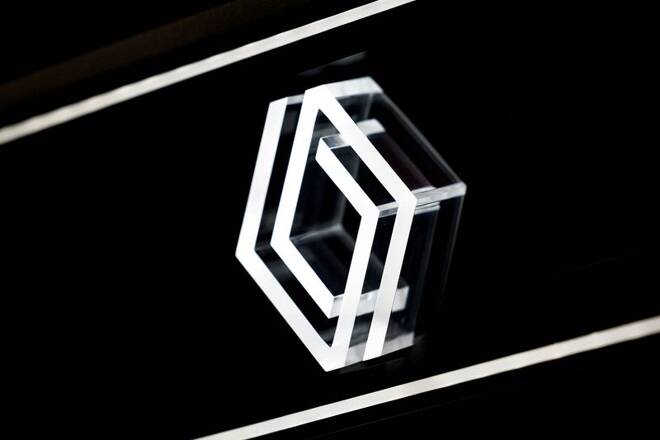Advertisement
Advertisement
Analysis-Separation anxiety over Renault’s five-way split
By:
By Gilles Guillaume PARIS (Reuters) - Analysts seeking less complexity from Renault at its investor day this week were disappointed to find that CEO Luca de Meo will split the company into five autonomous businesses.
By Gilles Guillaume
PARIS (Reuters) – Analysts seeking less complexity from Renault at its investor day this week were disappointed to find that CEO Luca de Meo will split the company into five autonomous businesses.
The French carmaker announced a major overhaul at a long-awaited presentation on Tuesday, dividing operations into five specialised businesses – each with its own profit & loss account and CEO – in an effort to boost profitability and increase the valuation of its different parts.
The main plank of the strategy is the separation of its combustion engine business from its electric vehicle (EV) operation. The engines operation will partner Geely in a 50-50 joint venture while the EV arm will be listed in the second half of next year.
But there will also be separate units for sports cars, recycling and mobility and financing. All three will be open to outside investors and external partners, from Geely to semiconductor company Qualcomm and internet giants such as Google.
The market was underwhelmed, with the shares falling 3.5% on the day and 4% on Wednesday as investors balked at the elaborate new structure.
Also weighing on sentiment was the lack of detail about Renault’s long-standing partnership with Nissan – an alliance that, in itself, has not been easy to manage for Renault.
“The separation of combustion engine/electric operations is critical to the investment case, but the split into five different units … introduces undue complexity for governance and valuation,” Jefferies analyst Philippe Houchois said in a note.
Electric push
An early mover in electric cars, Renault has fallen behind newer, more agile rivals such as Tesla. It needed a state-backed emergency loan to stay afloat during the COVID-19 pandemic, lost money in 2019 and 2020 and is now looking to strengthen its position and regain lost market share.
The new structure “may seem more complex, but with tight teams, we obtain better efficiency and therefore less complexity”, said a source familiar with the plan.
To stay in the race to go electric, which requires massive investment, Renault also had to attract partners only a year after returning to profitability.
Chief Financial Officer Thierry Pieton called the new set-up a “complete game changer” and CEO de Meo compared the “old” Renault to a pentathlon athlete who would struggle to win gold medals in all five sports disciplines.
By teaming up its new businesses with the best available partners, “Renault hopes to win medals in those different sports instead of remaining at an average level in all five”, he said.
Management, however, must avoid recreating duplication – both inefficient and costly – that it fought hard to remove in a drastic restructuring at the end of 2020.
Romain Gillet, auto analyst at S&P Global, said it was unclear, from an operational point of view, where cross-business functions such as human resources and customer support would fall.
Blurred boundaries?
“The boundaries may not be as clear-cut as has been presented,” he said.
Tom Narayan at RBC also wondered how separate the EV business – codenamed Ampere and set for a market listing – could be from the legacy combustion engine operations, given they share some manufacturing and other operations.
“This contrasts with what some other automakers have said, notably Volkswagen, Mercedes, and Stellantis, who do not believe in (electric vehicle) business separations,” he said.
According to Renault, the five separate entities will be better able to forge partnerships to respond quickly to the new technological challenges facing the industry.
Both Qualcomm and Google have announced plans to strengthen their partnership with Renault in designing vehicle software, and de Meo said that Qualcomm could also take a small stake in the Ampere division.
However, sources have told Reuters that Nissan – in talks to reshape its alliance with Renault – is wary of sharing its technology with too many outsiders, including a Chinese rival such as Geely.
De Meo on Tuesday said that Renault wanted to give fresh impetus to the Nissan alliance. But he added that, as in a marriage, “it is important for us to have our own hobbies and our own life”.
It remains to be seen if Nissan thinks this is becoming too much of an open relationship.
(Reporting by Gilles Guillaume; Writing by Nick Carey; Editing by Silvia Aloisi and David Goodman)
About the Author
Reuterscontributor
Reuters, the news and media division of Thomson Reuters, is the world’s largest international multimedia news provider reaching more than one billion people every day. Reuters provides trusted business, financial, national, and international news to professionals via Thomson Reuters desktops, the world's media organizations, and directly to consumers at Reuters.com and via Reuters TV. Learn more about Thomson Reuters products:
Did you find this article useful?
Latest news and analysis
Advertisement
